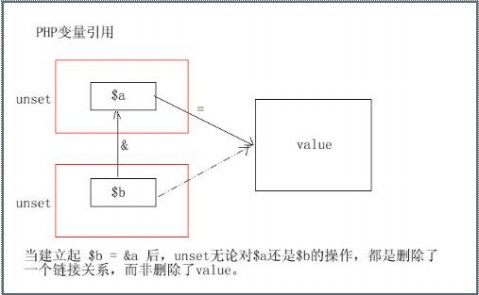
What is php reference?
The reference in PHP means: different names access the same variableContent. PHP reference (that is, adding an ampersand in front of variables or functions, objects, etc.). Doesn’t it look like you’re taking orders? Let’s explain it below:
1. Variable reference
PHP References allow you to use two variables to point to the same content
Example 1:
<?php $a="2010"; $b =&$a; echo $a;//这里输出:2010 echo $b;//这里输出:2010 $b="2012"; echo $a;//这里$a的值变为2012 所以输出 echo $b;//这里输出2012 ?>
Example 2:
<?php $a = "date"; $b = &$a; echo $a; // date echo $b; // date $b = "date1"; echo $a; // date1 echo $b; // date1 unset($a); echo $b; // date1 ?>
From the above two In the example, it can be seen that giving the memory address of $b to $b is not a simple assignment. Therefore, any operation on $b
will also affect $a
. Another way to put it is to add An alias is $b. If $a is deleted, only the name of the variable is deleted, but the content of the variable is not deleted. The content of the variable can still be displayed using the alias. (As shown in the figure)

Example 3:
<?php
function test(&$a)
{
$a=$a+100;
}
$b=1;
echo $b;//输出1
//这里$b传递给函数的其实是$b的变量内容所处的内存地址,通过在函数里改变$a的值 就可以改变$b的值了
test($b);
echo $b;//输出101
?>How Here
test(1);will make an error
 Indicates that parameters can only be variables, constants do not have address transfer .
Indicates that parameters can only be variables, constants do not have address transfer .
3. Function reference return
Function reference return is mostly used in objects, it is easy to understand here
UsestaticVariables as an exampleExample 4:
<?php
function &test()
{
static $b=0;//申明一个静态变量
$b=$b+1;
echo $b;
return $b;
}
//这条语句会输出 $b的值 为1
$a=test();
$a=5;
$a=test();//这条语句会输出 $b的值 为2
$a=&test();//这条语句会输出 $b的值 为3
$a=5;
$a=test();//这条语句会输出 $b的值 为6
?>Note, this function has output and returns a value.
$a = test(); Just assign the return value $b of function test to $a, It's just a very ordinary assignment, not a function reference return. Therefore, no matter what $a does, it will not affect $b.
$a = &test();The function is to point the memory address of $b to the memory address of $a The same place will produce an effect similar to $b = &$a. If the value of $a changes, that is, it becomes 5, it will also Affects the value of $b. So when executing $a = &test();$a = 5, there will be $b = 5, and after function processing, the output $b = 6;4.
Object referenceExample 5:
<?php
class a{
var $abc="ABC";
}
$b=new a;
$c=$b;
echo $b->abc;//这里输出ABC
echo $c->abc;//这里输出ABC
$b->abc="DEF";
echo $c->abc;//这里输出DEF
?>The above code is in
PHP5 The running effect is that in PHP5 the copying of objects is achieved through references. 上列中$b=new a; $c=$b; 其实等效于$b=new a; $c=&$b; PHP5中默认就是通过引用来调用对象, 但有时你可能想建立一个对象的副本,并希望原来的对象的改变不影响到副本。 为了这样的目的,PHP定义了一个特殊的方法,称为clone。 5. 引用的作用 如果程序比较大,引用同一个对象的变量比较多,并且希望用完 该对象后手工清除它,建议用 "&" 方式,然后用$var=null的方式清除。其它时候还是用php5的默认方式吧.。 另外, php5中对于大数组的传递,建议用 "&" 方式, 毕竟节省内存空间使用。 6. 取消引用 当你 unset 一个引用,只是断开了变量名和变量内容之间的绑定。这并不意味着变量内容被销毁了。 例如: 不会 unset $b,只是 $a。 可以参看变量的引用那段 7. global 引用 当用 global $var 声明一个变量时实际上建立了一个到全局变量的引用。 它等价于下面这段代码: 这意味着,例如,unset $var 不会 unset 全局变量。 8. $this 在一个对象的方法中,$this 永远是调用它的对象的引用。 另外说明 php中对于地址的指向(类似指针)功能不是由用户自己来实现的,是由Zend核心实现的,php中引用 采用的是“写时拷贝”的原理,就是除非发生写操作,才会拷贝,其他操作,指向同一个地址的变量或者对象是不会被拷贝的。 假如,有以下代码: $a="ABC"; At this time, $a and $b both point to the same memory address, rather than $a and $b occupying different memories. If you add the following code on top of the above code $a="EFG"; perform the "write" operation here Since the data in the memory pointed to by $a and $b needs to be rewritten, the Zend core will automatically judge at this time, automatically produce a data copy of $a for $b, and re-apply for a piece of memory. storage. The above is the detailed content of How to use the reference ampersand? Detailed explanation of php & symbol usage examples. For more information, please follow other related articles on the PHP Chinese website! <?php
$a = 1;
$b =& $a;
unset ($a);
?>
<?php
$var =& $GLOBALS["var"];
?>
$b=$a;




